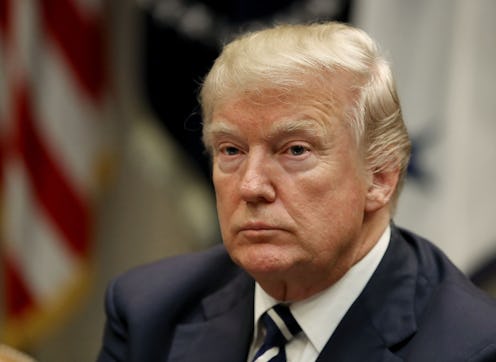News
You Need To See This Video Of A Reporter Straight-Up Asking Trump If He's A Racist

Not two weeks into 2018 and President Trump has caused an international outcry for reportedly calling El Salvador, Haiti, and other African nations "sh*thole countries." On Friday at the White House signing of a Martin Luther King Jr. Day proclamation, a reporter shouted a question at Trump: "Mr. President, are you a racist?"
At a bipartisan meeting on immigration policy on Thursday, Trump reportedly asked why immigrants from "sh*thole countries" like Haiti wanted to come to the U.S., and not people from Norway. It sparked swift and widespread condemnation, and many people pointed to it as further evidence of Trump's racism. The White House responded to the backlash with a statement hours later, but it didn't deny Trump said those words. After it grew into an international incident overnight, on Friday morning, he tweeted that the language he used in that meeting was "tough, but this was not the language used."
The question on Friday came directly after Trump had signed a proclamation honoring MLK Jr. Day at the White House. Flanked by King's family members, Trump turned to shake their hands as reporter April Ryan shouted the question at him. Another reporter asked if he was going to apologize for his "sh*thole" comment. Trump did not respond.
Trump's reported comments on Thursday are disturbing in their own right, but they also come at a particularly fraught time. The day after, Jan. 12, marked the anniversary of Haiti's deadly earthquake in 2010 which killed an estimated 300,000 people and displaced more than 1 million. In November, his administration announced that it would not renew the Temporary Protected Status (TPS) for Haitians who sought refuge in the U.S. after the 7.0 magnitude earthquake struck, effectively forcing nearly 60,000 people to return to a country that has not yet recovered from the disaster.
And it's not the first time Trump has reportedly made ugly remarks about Haitians. The New York Times reported in December that the president, angered by the number of U.S. visas given out to foreigners, said that Haitians "all have AIDS" and that Nigerians lived in huts. (The White House denied the report and called it "lies.")
For many, Trump's attitude towards people of color comes as no surprise; his political career, after all, first started when he became the leading proponent of the racist "birther" conspiracy theory against President Obama. Then he launched his presidential campaign with a stunning speech in which he called Mexicans coming to the U.S. "rapists" and criminals.
In the early days as a real estate developer, Trump and his father, Fred Trump, were investigated by the Justice Department for allegedly discriminating against potential black tenants. In 1989, he took out full-page ads in newspapers calling for the death penalty for five black and Latino teenagers who were accused of raping and killing a white woman in Central Park. In 2014, after DNA evidence cleared them of wrongdoing and the city paid them a $41 million settlement, Trump doubled down and insisted they were guilty.
While the backlash to Trump's racist comments in the past have mostly been confined within the country's borders, him calling impoverished — non-European — nations a "sh*thole" has become an international incident. Countries like Botswana and Haiti have issued statements condemning Trump's comment as racist; even the United Nations denounced him via a spokesperson: "There is no other word one can use but racist."
More than a year after his election and Trump still has not lost his ability to cause controversy. He did not answer Ryan's question on Friday, but after this latest round of comments, perhaps his silence spoke louder than words.